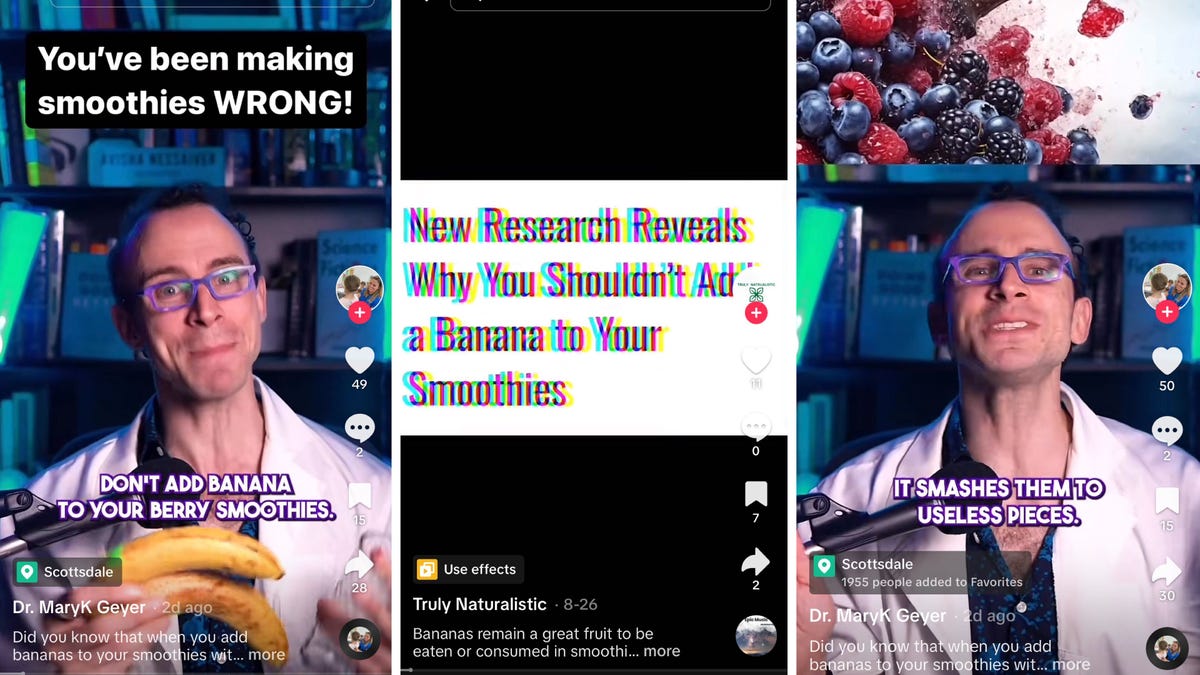TikTok Myth of the Week: Bananas Destroy Nutrients in Smoothies

TikTok loves banana smoothie. Within a few minutes of scrolling, you’ll see smoothie recipes, tips for freezing bananas (peel them first!), and video after video of people with visible abs loading bananas and other fruits into a blender in their kitchen. But wait! A new genre of smoothie content has emerged that now warns us to never add bananas to smoothies, lest they destroy the nutritional value.
Let’s debunk that smoothie tip you heard on TikTok.
Wait, since when do bananas ruin smoothies? Apparently, since August. A study published in the journal Food & Function found that bananas may reduce the bioavailability of flavon-3-ols in smoothies.
The study is real, and some TikTok users described it more or less accurately. They were wrong when they concluded that we shouldn’t add bananas to smoothies. Scientists have come to a different conclusion, and there is no need to give up bananas.
The press release announcing the study likely started this mess (it calls adding banana to smoothies a “mistake”), but it also mentions that the study’s lead author Javier Ottaviani “said bananas remain a great fruit to eat or consumed in smoothies.” Obviously, the warnings about bananas are exaggerated.
What the study actually found
The study did not look at the nutritional value of bananas or smoothies in general. He was looking at a specific biochemical question: does an enzyme in bananas react with one particular type of antioxidant found in cocoa extract?
Antioxidants are a broad class of chemicals. Vitamin C is an antioxidant, as well as lycopene and resveratrol (compounds known to be found in tomatoes and grapes), as well as anthocyanins, the red and blue pigments found in berries. The antioxidant studied here is none of the above, but is another antioxidant found in tea and cocoa. It’s called (-)-epicatechin and is part of a family of antioxidants called flavon-3-ols.
In the study, eight healthy men recruited from across the UC Davis campus were given the following on different days:
- Smoothie made with bananas, almond milk and cocoa extract containing epicatechin.
- A smoothie made with the same cocoa extract, plus strawberries, blueberries, blackberries, raspberries, almond milk, water, crushed ice, and yogurt (presumably the yogurt and ice were needed for texture).
- A glass of milk and a capsule with cocoa extract.
Bananas contain an enzyme called polyphenol oxidase (PPO), and scientists wanted to find out whether the PPO in banana could affect the levels of (-)-epicatechin, one of the flavon-3-ols, in foods such as smoothies.
Oddly enough, this happened! Our bodies convert epicatechins into other chemicals in the same family, and the researchers took blood samples from volunteers after each experiment to look for these chemicals. After drinking a berry smoothie or milk capsule, the levels of these chemicals in the blood increased. But after they drink the banana smoothie, that’s not the case.
This strongly suggests that the PPO in banana destroyed large amounts of epicatechins present in cocoa extract. Further experiments described in the same article show that this chemical activity occurs when the ingredients are placed together in a cocktail glass, and it likely also occurs in our stomach.
More importantly, what the study didn’t find
The study did not test a berry smoothie with banana added. Not a single smoothie combined berries and bananas.
The study did not test the levels of antioxidants or other nutrients in the berries. They specifically studied what happened to the antioxidants contained in cocoa extract.
The study also did not look at other aspects of nutrition other than this very specific chemical reaction (PPO from bananas plus (-)-epicatechins from cocoa extract).
Therefore, we cannot conclude that banana in a fruit smoothie “destroys” or “destroys” the nutrients or even the antioxidants of the berries.
Why you can’t “destroy” nutrition anyway
If an enzyme in bananas can reduce the bioavailability of a certain family of antioxidants… why does it matter? Have you been drinking a smoothie to increase your flavon-3-ol intake? Chances are you’ve tried to include some fruit and/or a nice breakfast or drink in your diet because you were hungry.
Regardless of PPO activity, bananas also contain fiber, which is good for you, and carbohydrates, which are macronutrients that our bodies can use in a variety of ways. A medium banana contains 20% of our daily requirement of vitamin B6, 17% of vitamin C and 8% of magnesium.
A recent study doesn’t take any of that away. You still get all of the above benefits no matter what happens to the flavon-3-ols in your smoothie.
If you’re really worried about your flavon-3-ols, there’s a better solution than skipping bananas.
Okay, but what if you really want to get a lot of good antioxidants in that fruit smoothie? After all, flavon-3-ols such as (-)-epicatechin are so good for us that the Academy of Nutrition and Dietetics (AND) has issued guidelines for them, even though flavon-3-ols are not essential nutrients . The recommendations say that consuming at least 400 milligrams of flavon-3-ols per day will provide health benefits.
If you want to get more flavon-3-ols, the best thing you can do is drink tea. You can reach this 400-milligram recommendation with just 10 ounces of green tea (two small cups) or 12 ounces of black tea. Berries contain flavon-3-ols, but in smaller quantities; it would take 6 cups of blackberries or 40 cups of blueberries to provide the same amount as those two cups of green tea.
By the way, the same AND article that recommended 400 milligrams of flavon-3-ols says it’s best not to get this nutrient from supplements. This is because the most common supplements that provide it are green tea extracts, and green tea extracts can cause stomach upset and even be toxic to the liver in large quantities.